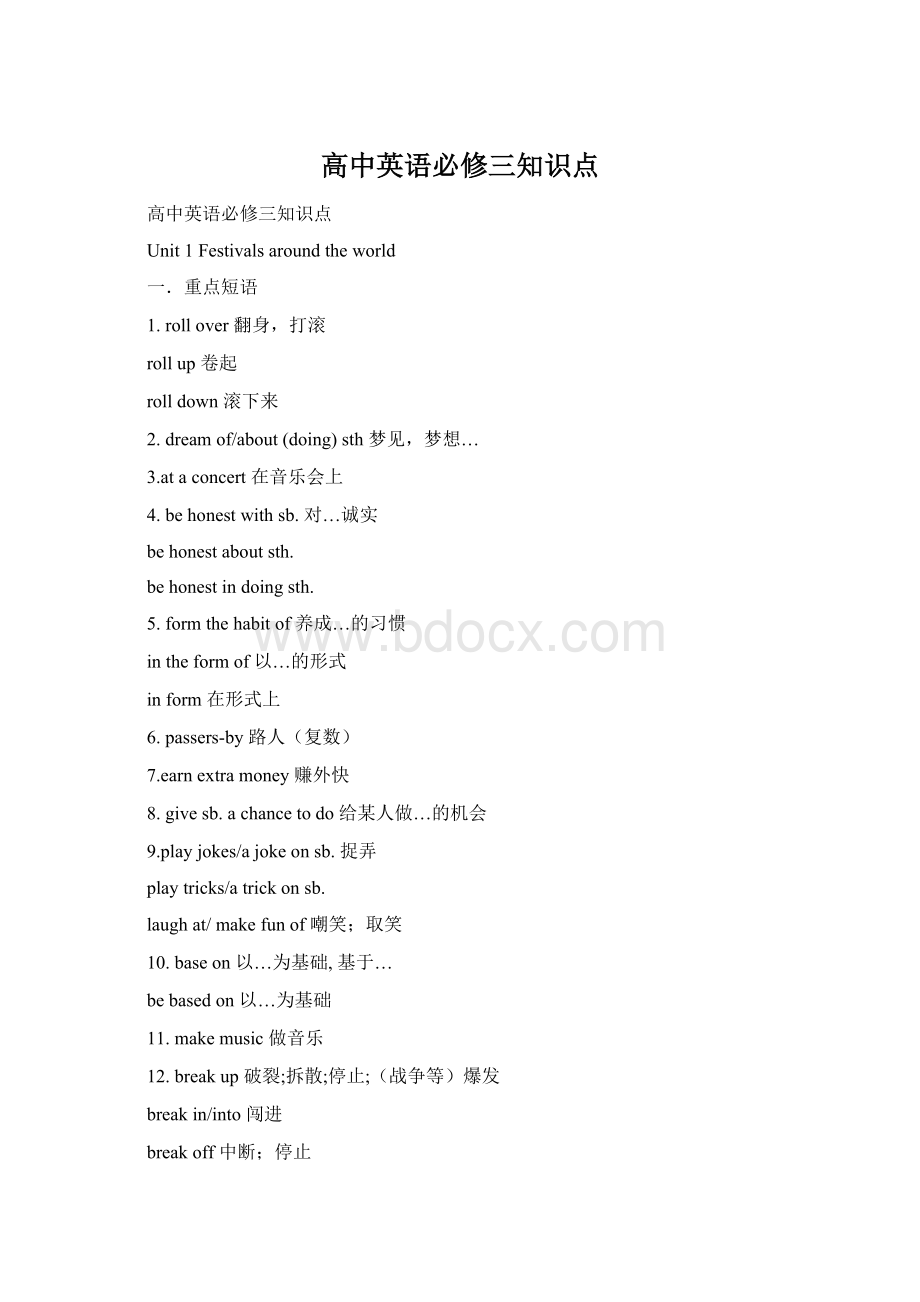高中英语必修三知识点.docx
《高中英语必修三知识点.docx》由会员分享,可在线阅读,更多相关《高中英语必修三知识点.docx(19页珍藏版)》请在冰豆网上搜索。

高中英语必修三知识点
高中英语必修三知识点
Unit1Festivalsaroundtheworld
一.重点短语
1.rollover翻身,打滚
rollup卷起
rolldown滚下来
2.dreamof/about(doing)sth梦见,梦想…
3.ataconcert在音乐会上
4.behonestwithsb.对…诚实
behonestaboutsth.
behonestindoingsth.
5.formthehabitof养成…的习惯
intheformof以…的形式
inform在形式上
6.passers-by路人(复数)
7.earnextramoney赚外快
8.givesb.achancetodo给某人做…的机会
9.playjokes/ajokeonsb.捉弄
playtricks/atrickonsb.
laughat/makefunof嘲笑;取笑
10.baseon以…为基础,基于…
bebasedon以…为基础
11.makemusic做音乐
12.breakup破裂;拆散;停止;(战争等)爆发
breakin/into闯进
breakoff中断;停止
breakdown坏掉,发生故障;(身体)垮掉
13.hitsb.on/inthe+身体部位:
击中某人的…
14.bychance/accident偶然,意外地
15.comeacross偶然遇见
16.sortout分类
17.beconfidentof/about/in对…有信心
18.give/putonaperformance/perform演出;表演
19.gowrong出了毛病
20.sincethen从那时起
eupwith提出
22.sticktodo=insistondoing坚持做某事
23.aboveofall首先,最重要的是
firstofall首先,第一
24.playmusicalinstrument演奏乐器
25.attractone’sattention/interest吸引某人的注意力/兴趣”
二.重点语法----情态动词
一、情态动词的特点:
1.没有人称和数的变化。
2.有些情态动词有过去式的变化:
e.g.will→would,can→could,may→might, dare→dared
二、情态动词的否定式:
情态动词+not+动词原形cannot:
can't,mustnot:
mustn't,neednot:
needn't
三、情态动词的用法及相互区别,是考试的内容之一
1.can,beableto beableto表示经过努力后,能够做到;beableto有多种形式的变化。
can
1).表示体力或脑力方面的能力;
2).表示允许、可能性。
could是can的过去式,表示过去有能力及过去存在的可能性;用于疑问句表示委婉地提出问题。
2.may表示询问或说明一件事可不可做;表示某事有可能发生。
might是may的过去式;用在疑问中比may委婉、客气。
1)-MayItakethisbookoutofthereading-room?
-No,youmustn't. (Yes,youmay.)
2)-MightImakeasuggestion?
-Yes,youmay.
3.must
1).表示必须要做的事:
必须
2)表示很有把握的推断:
一定,准是。
have(has)to:
have(has)gotto 必须,不得不。
过去式:
hadto
3)-MustIgettothestationbeforethreeo'clock?
-Yes,youmust.(No,youneedn't.)
4)I'mafraidyouwillhavetowaitawhile.
5)Shemustbeintheclassroomnow.
4.shall
1)在疑问句中,用于第一、三人称表示说话人征求对方的意见或向对方请求。
2)用于二、三人称,表示说话人给对方的命令、警告、允诺等概念。
1)-ShallIplaceanorderwithyounow?
-No,youneedn’t.
-Shallheturndowntheradioabit?
-
Yes,please.(No,pleasedon't.)
2)YoushallhavetheEnglishbookassoonasIfinishit.
3)Everythingthatheownsshallbetakenawayfromhim.
5.should 应该;应当
1)Youshouldlistentothedoctor'sadvice.
2)Youshouldstudythearticlecarefully.
6.will,would
1)在疑问句中用于第二人称,表示说话人向对方提出请求或询问。
用would语气更加婉转。
2)will表示现在的习惯性动作或状态;would表示过去的习惯性动作或状态。
3)will用于各种人称,表示意志、意愿、决心、允诺;would表示过去时间的意志、意愿、......。
-Willyoucomewithme?
-Yes,Iwill.(Iamsorry,Ican't.)
-Wouldyoutellussomethingaboutyourself?
-Yes,Iwill.
7.oughtto 应该;应当
1)Yououghtn'ttosmoketoomuch.
8.dare 1.daretocome 2.darecome
1)Hedarenottellthetruth.
2)Hedoesn'tdaretocomeoutatnight.
9.need
1).作为情态动词:
必须
2).作为实义动词:
需要
A.主语是人 need(todosomething;tobedonebysomebody)
B.主语是事物 need(doing;tobedone)
1)-Dotheyneedtotakeanybookswiththem?
-No,theydon'tneedto.
2)-Needwebuyanynewequipment?
-No,weneedn't.
3)Thisfarmtoolneedsrepairing.
Thisfarmtoolneedstoberepaired.
情态动词+不定式的完成式是高考的考试要点
1、musthavedone,“一定做过/一定已经...”,表示对过去情况极大把握地推测,仅用于肯定句
2、may/mighthavedone也许做过某事(推测);本来可以做某事却没做
3、can'thavedone为否定句或疑问句,对过去的推测“不可能,一定没做过某事”
couldhavedone本来可以做某事却没做
4.needn’thavedone表示”不必要做某事,但做了”,而needn’tdo则表示”不必做(也没做)”
5.、oughtto/shouldhavedone表示”本来应当做的却没做”
oughtn’t/shouldn’thavedone本来不应该做某事却做了
6、would/could/might/should+havedone用来表示与过去事实相反的虚拟语气
7、wouldratherhavedone表示”当时宁愿做了某事”,否定形式:
wouldrathernothavedone
e.g.IfIhadbeenfreethatday,Iwouldhavegonewithyou.
8、wouldlike/lovetohavedone表示”本想做某事”而实际上未做。
Unit2Healthyeating
一.重点短语
1.ahealthydiet健康饮食;
abalanceddiet平衡的饮食
2.indifferentway用另外方式
3.mostoften最经常
4.feelfrustrated感到沮丧
5.bylunchtime到午餐时间
6.musthavehappened一定发生过
7.attheendofthestreet在街道的尽头
8.betiredof厌倦
9.beamazedatsth.对...感到惊奇
10.throwaway扔掉
11.getawaywith逃脱
12.telllies说谎
13.energy-givingfood提供热量的食物
body-buildingfoods提供营养的食物
14feelfit保持精力旺盛
15.theweaknessofthediet饮食的弱点
thestrengthofthediet饮食的优点
16.dosomeresearchinto做一些...方面的研究
17.earnone’sliving谋生
18.beindebt负债
19.glareat怒视
20.moveround绕过
21.spyon在暗中侦察;打探
22.upsetsb.使......不安
23.lookill感到不舒服feelsick感到恶心
24.heavyfood不易消化的食物
25.chat(ting)about聊起关于......
26.servewith用......配
27.ratherthan而不是
28.cutdown减少
29.beforelong不久
二.重点语法----情态动词
详见第一单元
Unit3ThemillionPoundBankNote
一.重点短语
1.knowabout了解关于…事
2.makeabet打赌
3.winorlosethebet在打赌中赢或输
4.havebadluck运气不好
5.stepinside走进里面
6.leadtheway带路
7.Iwonderif我想知道是否…
8.gorightahead说下去
9.asamatteroffact事实上
10.byaccident偶然
11.sailoutofthebay驶出海湾
12.stareat盯着
13.towardsnightfall到夜幕降临时
14.carry…outtosea把…带到了大海
15.giveoneselfupforlost因为迷路而绝望
16.workasanunpaidhand免费劳动
17.accountfor导致
18.tobehonest坦白地说
19.yourideaofsomekindofjoke你认为的一种笑话
20.beonmyway上路
21.showsb.out把某人带出去
22.beconfidentabout对…自信
23.thecostofajourney旅行费用
24.givesb.aride让某人搭车
25.loseone’spatience失去耐心
26.dofiftyjumpswithoutstopping不间断地连续跳五十下
27.fallover跌到
28.accountforyourbehavior对你的行为做出解释
29.bejealousoftheothers’success嫉妒别人的成功
30.showawillingnesstodosth.表示乐意做谋事
31.stayoutofjail免坐牢
32.bereserved被预定了
33.takethegentleman’sorder让那位绅士点菜
34.thelookonthewaiter’sface服务员脸上的表情
35.takeachance碰碰运气
36.readthebill看帐单
37.inarudemanner用粗鲁的方式
二.重点语法:
名词性从句
主语从句
名词性从句宾语从句
表语从句
同位语从句
考点1主语从句
从属连词
(不作成分)
that,whether
连接代词
(作成分)
what,who,whom,whose,which,wh+ever
连接副词
(作状语)
when,where,how,why
1.连接词that,whether引导
①Thatthecollegewilltakeinmorenewstudentsthisyearistrue.今年这所大学将招收更多新生是真的。
②Whetherhecanfinishhistaskontimeisofgreatimportance.他是否能按时完成任务非常重要。
特别提示
(1)if不能引导主语从句。
(2)形式主语it替代主语从句。
常见的it替代主语从句的句式主要有以下几种:
A.It+系动词+形容词+that从句。
如:
Itisquiteclearthatthewholeprojectisdoomedtofailure.
注:
在句型“Itisimportant(necessary,strange,natural)that....”中,that后面的从句中的谓语动词用:
should+动词原形
It’snecessarythatweshouldhaveawalknow.
B.It+系动词+名词+that从句。
如:
Itisourhopethatthetwosideswillworktowardspeace.我们的希望是双方能朝着和平的方向发展。
注:
在Itisdemanded/suggested/ordered/required….that-clause句型中从句用(should)+动词原型
Itisdemandedthatweshouldworkoutaplan.
C.It+be+v.ed形式+that从句。
如:
Itisannouncedthattheplanhasbeensuccessfullycarriedout.据宣布计划已经顺利实施。
注:
在Itisapity/ashame/nowonderthat…..句型中从句也常用(should)+动词原型
It’sapitythatyou(should)missagoodchance
2.连接代词引导
①Whatwecan’tgetseemsbetterthanwhatwealreadyhave.我们得不到的东西似乎比我们拥有的东西好。
②whotheletterwasfromisstillunknown.这封信是谁寄出的还不清楚。
③Whicheverofyougetsherefirstwillgettheprize.你们当中第一个到达这里的人将获得奖项。
3.连接副词引导
①Howacupuncturereducesandrelievespainisunclear.针灸是如何减轻和解除疼痛的还不清楚。
②whydinosaurssuddenlydisappearedstillremainsamystery.恐龙为什么突然消失了还是个谜。
考点2宾语从句
从属连词
(不作成分)
that,whether,if
连接代词
(作成分)
what,who,whom,whose,which,wh+ever
连接副词
(作状语)
when,where,how,why
1.连接词that,whether,if引导
①Ithink(that)youshouldturntotheteacherforhelp.我认为你应该向老师寻求帮助。
②Idon’tknowif/whetherhestillliveshereaftersomanyyears.我不知道这么多年后他是否还住在这儿。
特别提示
whether/if都意为“是否”。
一般情况下,它们可以互换,口语中常用if,但以下情况中,只能用whether。
(1)与ornot紧接连用时。
如:
Letmeknowwhetherornotyoucancome.请让我知道你是否能来。
(2)作介词的宾语从句时。
如:
Weareinterestedinwhetheryouwillattendthemeeting.我们对你是否参加会议感兴趣。
2.连接代词和连接副词引导
连接代词有what,who,whose,whatever,whichever,whoever等,连接副词有when,where,why,how等。
如:
①Sheaskedmewhosehandwritingwasthebestintheclass.她问我班上谁的书法最好。
②I’11justsaywhatevercomesintomymind.我想到什么就说什么。
③DoyouknowwhentheancientOlympicGamesbegan?
你知道古代的奥运会是什么时间开始的吗?
④I’vebeenthinkingabouthowwecanmakethenewspapermoreinteresting.我一直在考虑如何使我们的报纸更用趣。
3.宾语从句的语序
在宾语从句中要用陈述句语序。
如:
①Heaskedmewhenwecouldsetoutthenextday.他问我第二天什么时候可以出发。
②Didyoufindoutwhereshelosthercar?
你查出她在哪里丢的车了吗?
4.宾语从句的时态
(1)当主句的谓语动词是一般现在时时,其宾语从句的时态可以是任何适当的时态。
如:
①Shesays(that)sheworksfromMondaytoFriday.她说她周一至周五上班。
(从句是一般现在时)
②shesays(that)shewillleaveamessageonhisdesk.她说她要在他桌子上留个便条。
(从句是一般将来时)
③Shesays(that)shehasneverbeentoMountEmei.她说她从来没有去过峨眉山。
(从句是现在完成时)
(2)当主句的谓语动词是一般过去式时,其宾语从句的时态一般要用适当的过去时态。
如:
①Hesaidtherewerenoclassesyesterdayafternoon.他说昨天下午没有课。
(从句是一般过去时)
②Hesaidthathewasgoingtotakecareofthebaby.他说他会去照看这个婴儿。
(从句是过去将来时)
③Hesaidthattheywerehavingameetingatthattime.他说他们那时正在开会。
(从句是过去进行时)
(3)当宾语从句是表达客观真理和规律的句子时,其时态仍旧用一般现在时。
如:
①Theteachertoldusthatnothingisdifficultifweputourheartsintoit.老师告诉我们世上无难事,只怕有心人。
②Hesaidthatlighttravelsmuchfasterthansound.他说光比声音传播得快。
特别提示
在使用宾语从句时需要注意下面几点:
(1)动词find,feel,think,consider,make,believe,guess,suppose,assume等后有宾语补足语时,则需要用it作形式宾语,而将that宾语从句后置。
如:
①Ithinkitnecessarythatwetakeplentyofboiledwatereveryday.我认为每天多喝开水是有必要的。
②IhavemadeitarulethatIkeepdiaries.我每天写日记成了惯例。
(2)hate,like,take,owe,have,takeforgranted等表示“喜欢;痛恨;认为”的动词或动词短语和seeto表示“注意,留意”后有宾语补足语时,需要用it作形式宾语而将宾语从句后置。
如:
①Ihateitwhentheytalkwiththeirmouthfulloffood.我讨厌他们满嘴食物说话。
②Whenyoustarttheengine,youmustseetoitthatthecarisinneutral.启动发动机时,一定要使汽车的离合器处于空档位置。
(3)介词后的宾语从句。
如:
①Sheisalwaysthinkingofhowshecandomoreforothers.她总想着如何才能为别人做得更多。
②Wearetalkingaboutwhetherweadmitstudentsintoourclub.我们正在讨论是否让学生加入我们的俱乐部。
(4)宾语从句的否定转移。
将think,believe,suppose,expect,fancy,imagine等动词后面宾语从句的否定词转移到主句中,即主句的谓语动词用否定式,而从句的谓语动词用肯定式。
如:
①Idon’tthinkIknowyou.我想我并不认识你。
②Idon’tbelievehewillcome.我相信他不回来。
(5)在于表